











PARASHAT EMOR
SHABBAT: BEGINS ENDS
London 20:35 21:49
20:52 22:16
20:47 22:20
20:51 22:23
20:00 22:02 Antwerp 21:12 22:37
Bournemouth 20:35 21:58
Gateshead 20:53 22:31
Jerusalem 18:55 20:12














PARASHAT EMOR
SHABBAT: BEGINS ENDS
London 20:35 21:49
20:52 22:16
20:47 22:20
20:51 22:23
20:00 22:02 Antwerp 21:12 22:37
Bournemouth 20:35 21:58
Gateshead 20:53 22:31
Jerusalem 18:55 20:12

Israel’s 76th Independence Day has been unlike any since its establishment in 1948.
Yom Hazikaron ceremonies this week commemorated Israel’s fallen soldiers and victims of terror but the IDF operation in Rafah and plight of 130 hostages held in captivity by Hamas in Gaza were central themes for political and communal leaders in Israel and around the world.

Prime Minister Benjamin Netanyahu, Pres ident Isaac Herzog, Knesset Speaker Ohana and heads of security forces attended a state ceremony at Mount Herzl, Jerusalem.
Netanyahu, heckled by some attendees and reportedly bereaved families during his ad dress, recalled the “wave of hatred” on October 7 and “unprecedented savagery”.
one else forget,” he said. “We do not forget the hostages, not for one second. We are working

perpetrated the attack, till the very last one of them. We will sever their arms so that they can no longer raise them against Israel.”
Regarding Israel’s Independence Day, Netanyahu said: “Israel’s 76th year has been marked by enormous pain and loss. Not just for Israel, but for Jewish communities throughout the world. The clear and present threats to Israel. The grief over our soldiers who fell and were injured protecting and defending. The shocking scale of







Continued from page 1
Over 100,000 Israelis attended a vigil in Tel Aviv’s Hostage Square with hostages families.
Torches were lit in Kfar Aza, Hof Zikim, Sderot, Nahal Oz and locations affected on the October 7 terror attack.
In Binyamina, torches were extinguished, reversing the protocol at Independence Day celebrations.
President Isaac Herzog, in an address at the Western Wall, said there was normally a ‘special silence’ at the sound of the Shofar but not this year.
“This year is not like any other year,” he said. “A siren that began at 6:29am on October 7 has continued alongside us ever since. The cry of a nation, the cry of national mourning… It is a symbol of the mourning and sorrow of an entire people in this year, a year of national mourning.”
Addressing hostages and their families, he said: “The entire nation is with you. We must summon courage and choose life. Not to rest and not to be quiet until they all return home.”
After speaking about past fallen heroes, Herzog returned to the conflict.
“The past few months have been very painful. But in them, we learned about the strength of a wonderful and awe-inspiring people, who rose from the terrible destruction and fought as lions…
“The tear in the heart of the people must heal the tear in the nation. A call to action, a call to rise up. Rise up as one people… The right to defend the security of Israel.”
Herzog recognised 120 ‘outstanding soldiers’ at an Independence Day ceremony and hosted a shortened reception for ambassadors and diplomatic corps stationed in Israel.
In his address to emissaries Herzog said

that Israel was a story of “bold and obstinate hope”.
The terror group, he noted, was attempting to weaken the State of Israel but especially the “winds of warm peace” promising change.
Herzog added: “We must stand together as champions of moderation, democracy and peace. We must speak loudly and forcefully against the startling spike in antisemitism. Most importantly, we must stand together as a family of nations and respond decisively to a despicable, ongoing crime against humanity, the cruel abduction of men, women and children, of so many different nationalities, of over 220 days. Our hostages.”
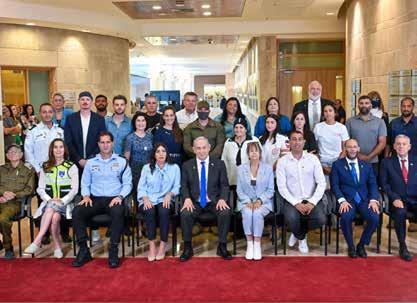
Tuesday, they eliminated 15 terrorists at an UNRWA school in the Nuseirat refugee camp in the Gaza. Hamas reportedly planned and carried out terror operations from the school. At least 10 terrorists were affiliated to Hamas.
Herzog called on all nations to act forcefully to bring the hostages home.
Israel’s Independence Day torch lighting ceremony was pre-recorded for the first time. In recorded remarks, Netanyahu did not speak about the raging war, the 10/7 massacre but rather Israel’s independence.
“Independence means being a free people in our country, having the freedom to defend ourselves by ourselves and the sovereignty to satisfy the behest of generations,” he noted. “We are doing all this together. Just like our courageous soldiers fight together, shoulder to shoulder, in tanks and armoured vehicles, in tunnels, in aircraft and navy vessels. At the moment of truth, the entire country took up arms. What an incredible generation we have, a generation of triumphant heroes.”
Rocket sirens sounded across Israeli northern communities close to the border on Tuesday after missiles were launched. IDF struck Hezbollah targets in southern Lebanon.
The IDF and Shin Bet announced, also,
Since Israel’s independence, 25,040 IDF soldiers have died in Israel’s wars. Since October 7, 716 IDF soldiers and security personnel have been killed in action. Israeli civilians murdered in terror attacks total 5,100.
At the time of going to press deeply worrying news began to break of a tragic incident affecting numerous IDF soldiers during an operation in Gaza’s Shuja’iyya neighborhood.
Details are limited by military censorship but there are reports that up to 15 soldiers could be among fatalities and major injuries. A second incident surrounding a booby-trapped building at the same time in Jabalia in northern Gaza was also reported on news feeds with video footage of helicopters arriving at Israeli hospitals with injured troops.
Tehilim are being recited for the injured.


President Isaac Herzog has led support to Jewish students around the world facing hostility and intimidation on campuses.
In the United States, President Joe Biden reacted strongly after police intervened. And the European Jewish Congress has called on Europe’s leading universities to protect Jewish student rights from intimidation and attack. Herzog, in a message of solidarity, said: “The people of Israel are with you. We see the shameless hostility and threats. We feel the insult, the breach of faith and breach of friendship. We share the apprehension and concern. We see prominent academic institutions, halls of history, culture and education contaminated by hatred and antisemitism fuelled by arrogance and ignorance, and driven by moral failings and disinformation. We watch in horror as the atrocities of October 7 against Israel are celebrated and justified.
“In the face of violence, harassment and intimidation, as masked cowards smash windows and barricade doors, as they assault the truth and manipulate history, together we stand strong. Together
we will continue building a flourishing, life-affirming nation.
“As they chant for intifada and genocide, we will work, together, to free our hostages held by Hamas, and fight for civil liberties and our right to believe and belong, for the right to live proudly, peacefully and securely, as Jews, as Israelis, anywhere. In the face of this terrifying resurgence of antisemitism do not fear, stand proud, stand strong for your freedom. Israel stands with you.”
Biden said: “Vandalism, trespassing, breaking windows, shutting down campuses, forcing the cancellation of classes and graduations, none of this is a peaceful protest,” he said. “Threatening people, intimidating people, instilling fear in people is not peaceful protest. It’s against the law.
“There’s the right to protest but not the right to cause chaos. People have the right to get an education, the right to get a degree, the right to walk across the campus safely without fear of being attacked.”
He added: “There should be no place on any campus, no place in America for antisemitism or threats of violence against Jewish students. There is no place for hate speech or violence of any kind, whether it’s antisemitism, Islamophobia,
or discrimination against Arab Americans or Palestinian Americans.
“I understand people have strong feelings and deep convictions. In America, we respect the right and protect the right for them to express that. But it doesn’t mean anything goes. It needs to be done without violence, without destruction, without hate, and within the law. As President, I will always defend free speech. And I will always be strong in standing up for the rule of law.”
The EJC acted after European universities experienced occupations and demonstrations from anti-Zionist activists.
Protesters appear to be following extreme actions across US campuses.
In a letter to rectors at European universities, EJC President Dr. Ariel Muzicant noted freedom of speech on Europe’s university campuses was a misnomer if it “champions violence and intimidation of Jewish students”.
“Calls to ‘globalise the intifada’ or open glorification of Islamist terror organisations like Hamas and Hezbollah, or the Houthis of Yemen, don’t really sit well with a movement that claims to be progressive, non-violent and merely supporting peace,” Muzicant said.
Jewish students have been denied access to facilities and harassed by violent mobs at Paris’s prestigious Sciences Po and brutally attacked at the Free University of Brussels.
“The violence of language and harassment are always linked to an agenda of organisations that have one thing in common… the total, immediate and violent eradication of the State of Israel,” Muzicant told university heads, adding that radical demonstrations were the “very antithesis” of free academic expression and engagement.
“Not only do these actions glorify violence against Jews but they attempt to muzzle any form of expression by Jewish students, labelled Zionists,” he said.
“Demonstrators are instructed not to engage with Zionists, the antithesis of an enlightened university pledged to protect freedom of speech and access.”
Recalling darker times when Jews were forced out of Europe’s universities, Muzicant noted: “Rectors must act against these demonstrations and occupations because if they do not, the result will be the denial of access to higher education to most Jews in Europe’s universities.”
Jewish organisations welcomed a recent roundtable meeting at Downing Street with Prime Minister Rishi Sunak to address the rise in antisemitic abuse on campus and disruption to students’ learning.
Sunak, Education Secretary Gillian Keegan, Communities Secretary Michael Gove and Security Minister Tom Tugendhat called on vice chancellors to ensure a zero-tolerance approach to antisemitic abuse on campuses around the United Kingdom.
Campaign Against Antisemitism thanked Sunak for making it clear antisemitism has no place at universities. But they had a warning for vice chancellors if they don’t act to halt the surge in incidents experienced by students.
“It is up to vice-chancellors to show that they agree (with Sunak),” a spokesman said. “If they do not, we will do everything that we can to hold them and their institutions to account.
“A vocal minority on our campuses are disrupting the lives and studies of their fellow students and, in some cases, propagating outright harassment and antisemitic abuse. That has to stop”.
CAA’s spokesperson added: “Over the last couple of weeks, we have seen anti-Israel thugs swarm university campuses with calls for intifada, the eradication of the State of Israel, and references to Hamas as
‘freedom fighters’. The growing number of encampments comes against a backdrop of escalating antisemitism, with Jewish students facing verbal abuse, receiving death threats and enduring physical violence. The hostile environment for Jews that has been created on British campuses challenges the very foundations of academia. Bastions of inclusivity and diversity operating in pursuit of truth are becoming cesspits of racist hate and intimidation.”
The UJS has criticised a “toxic environment” faced by Jewish students across the country.
According to the Community Security Trust, there has been an increase of 203% in university-related antisemitic incidents.
Sunak ahead of the meeting said: “Universities should be places of rigorous debate but also bastions of tolerance and respect for every member of their community.”
“We will not stand by whilst Jewish students are harassed and intimidated in education”, added Keegan. “Antisemitism is unacceptable, and it will not be tolerated in our universities, or across our society”.
Outlining how the Government is tackling antisemitism, Keegan has written to all university Vice Chancellors to outline how they must take “swift, robust and active disciplinary action” against antisemitic students.
“The Government is investing £7 million to help tackle antisemitism in our education system”, she said. “They are under no illusion of the high standard they should be held.”
Keegan noted: “Universities must crack down on antisemitism and ensure that protests do not unduly disrupt university life.”
In the Autumn Statement, the
Chancellor announced £500k to the University Jewish Chaplaincy. Chaplaincy supports over 8,500 students at over 100 universities across the UK.
StandWithUs UK, meantime, have condenmed anti-Israel tent ‘encampments’ on a growing number of university campuses, notably at UCL.
Chants include ‘Resistance is Justified’ and ‘The State of Israel Must Go’.
Whilst supporting the right to freedom of expression, they noted: “There is no place for promoting bigotry, discrimination or violence against any individual or group based on ethnicity, religion, national origin or otherwise,” said a spokesman. “We call on university administrations nationwide to take all necessary steps to ensure a safe learning environment for all students.”
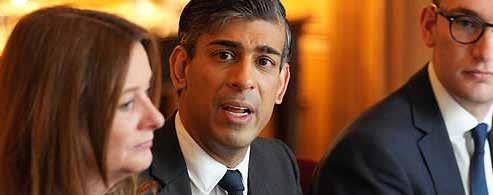
Addressing students, StandWithUs added: “If a genocidal terrorist organisation says you are helping their cause, you are on the wrong side of history. Your actions do nothing but fuel more division, hatred, and conflict on your campuses and in the Middle East.”
Regarding Jewish, Israeli and Zionist students, faculty and professors, they noted: “We are facing hate like we have not seen since the Nazi era. Now is the time to come together, uplift one another, and stand strong in the face of ignorance and hate.”














Israel’s Ambassador to the UN, Gilad Erdan, has slated the United Nations General Assembly backing Palestinian statehood last Friday.
A vote was ratified by 143 nations. Nine voted against, 25 abstained.
Erdan destroyed a copy of the UN Charter before the assembly and said the body had welcomed a terror state into its organisation.
Money issues are more common than you think. Even for higher earners.
No matter what you earn, Mesila offers confidential, expert one to one coaching, using tried and tested steps to help maximise your income.
CONTACT US TO FIND OUT MORE coaching@mesilauk.org www.mesilauk.org 0333 344 1711

“You are shredding the UN charter with your own hands,” he raged. “That’s what you’re doing. Shredding the UN charter. Shame on you.”
The US voted against the resolution and will veto a future vote for Palestinian membership.
“Efforts to advance this resolution do not change the reality that the Palestinian Authority does not currently meet the criteria for UN membership under the UN charter,” spokesperson Nathan Evans, said. “The draft resolution does not alter the status of the Palestinians as a ‘non-member state observer mission.’”
Argentina, Czech Republic, Hungary, Israel, Micronesia, Nauru, Palau and Papua New Guinea voted against the resolution. The UK abstained.
Israel has called on the US to cut UN funding. Republican senators are introducing legislation.
“The US should not lend credibility to an organisation that actively promotes
and rewards terrorism,” noted Senator Mitt Romney. “By granting any sort of status at the UN to the Palestine Liberation Organisation, we would be doing just that. Our legislation would cut off US taxpayer funding to the UN if it gives additional rights and privileges to the Palestinian Authority and the PLO.”
World Jewish Congress President Ronald S. Lauder said the UN General Assembly was obstructing a two-state solution.
“Hamas, which has been rightly designated as a terrorist organisation, can play no role in the future of the Palestinian people,” he said. “It is crucial for the international community to prioritise not only symbolic gestures but also substantive actions that foster real peace. This includes addressing the urgent issue of hostages in Gaza and confronting the continued threat posed by Hamas.”
WJC called on the UN and its bodies to prevent extremist factions derailing the Palestinian cause.
Spain, Ireland, Slovenia and Malta are reportedly planning to recognise a Palestinian state.
Palestine has had non-member observer status since 2012. The UN Security Council decides membership. The UN resolution allows Palestine to take part in debates, propose agenda items and have representatives on committees. Palestine does not have a vote.

Researchers at Tel Aviv University and Sheba Medical Center have advanced an understanding of the risk of cancer in heart disease patients.
Research published in medical journal Circulation was conducted by Prof. Jonathan Leor at TAU and Taman Institute at Sheba’s Leviev Center and TAU research student Tal Caller.
In 2013, Israeli cardiologist Tal Hasin demonstrated a connection between heart failure and cancer. Leor noted: “Many theories have been proposed to explain the increased risk of cancer in heart patients. They started with shared risk factors such as smoking, diabetes and obesity and ended with a single protein or molecule. We showed for the first time that the diseased heart secretes sEVs that contain thousands of different growth factors. These bubbles directly promote the growth of certain tumors and also modulate the immune system, making the body more vulnerable to tumor growth.”
When TAU researchers inhibited sEVs formation in animal models with heart disease the risk of cancer decreased. But it is not a therapeutic option due to side effects.
Leor noted: “We tried a different strategy. Treat the patient’s heart to reduce the damage to the cardiac tissue so that it secretes fewer sEVs. Spironolactone is a well-known, old, and effective drug used to treat heart failure. We treated the animals at a very early stage of the disease and found that the heart secreted 30% fewer sEVs and the cancerous tumors grew more slowly. Our experiment shows it is possible to intervene in heart disease in a way that reduces the risk of cancer among heart patients.”
As for clinical implications, Caller said: “It may be necessary to adjust existing treatments for the heart so that they also consider the risk of cancer. In addition, it is possible to find biomarkers among heart patients that will indicate an increased risk of cancer since not all patients are at an increased risk. Much work is still required to unravel the connection between the two.”
Moshe Bar-Haim, Israel Cancer Association CEO added: “Research has no territorial boundaries. We hope the new research will allow for immediate application in Israel and around the world for the benefit of accurate treatment for patients.”
Yad Vashem has launched the ‘Who Is Your Holocaust Hero? campaign.
The initiative encourages the public to build connections with Holocaust stories through short video clips and share a Holocaust Hero on social media platforms.
Yad Vashem’s core mission is to preserve the memory of the Holocaust.
“This unique campaign comes at a particularly critical juncture,” said Yad Vashem chairman Dani Dayan. “As the eyewitness generation fades away, we are left with an irreplaceable void. By sharing their stories, we are ensuring that they will never be forgotten. By sharing and creating a community of remembrance on social media we can amplify their voices, garnering global attention.”
As part of the initiative, Yad Vashem has invited distinguished individuals to become Ambassadors of Holocaust Memory and record a short video introducing their personal Holocaust hero.
Teaming up with Hollywood’s Lana Melman, author of Artists Under Fire’, Yad Vashem has support from entertainment and international figurers.
Notable participants include producer
Ben Silverman, director Jeff Melman, actors Patricia Heaton, James Maslow, Mark Pellegrino and Gene Simmons. Political figures include Lord Eric Pickles, Prof. Alan Dershowitz and President of the Claims Conference Gideon Taylor. Social media influencers include Broadcast Journalist John Ware and celebrity chef Eitan Bernath.
“We are living in a time of anti-Jewish hate not seen since Nazi Germany”, noted Melman, author and CEO of Liberate Art. “The phrase ‘Never Again’ is not a slogan, it is a vow, a promise humankind made to G-d and each other after the inhumanity and horrors of the Holocaust. By sharing the stories of Holocaust Heroes, we are reminded that none of us can be silent about where this road leads us. We have a right to be safe and Jewish.”
“The Claims Conference is proud to be part of the campaign,” said Taylor. “Each survivor is a hero to us.”
“Any moment I can remind the world and successive generations of the truth of our history, albeit painful and difficult, is critical, we must never forget.” added Ben Silverman, Producer of The Office, Ugly Betty and The Office.
Anti-Israel protests at UK universities spread this week, with encampments or building occupations on campuses across the country including Cambridge, Oxford, Bristol, Newcastle, Warwick, Leeds, Edinburgh and Birmingham.
Vice Chancellors from some of the country’s leading universities joined forces with the government last Thursday
to discuss actions to address the rise in antisemitic abuse on campus and disruption to students’ learning.
The Prime Minister, Education Secretary, Communities Secretary and Security Minister called on university leaders to ensure a zero-tolerance approach to antisemitic abuse is adopted on all campuses.
The Prime Minister has called on university leaders to protect Jewish students.
The Prime Minister, Rishi Sunak, said: “Universities should be places of rigorous debate but also bastions of tolerance and respect for every member of their community.”
“A vocal minority on our campuses are disrupting the lives and studies of their fellow students and, in some cases, propagating outright harassment and antisemitic abuse. That has to stop.”
Following the Prime Minister’s
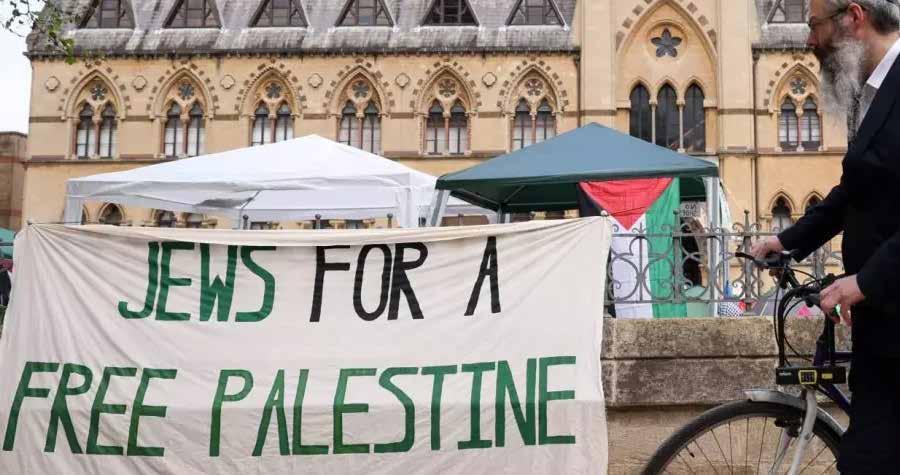
announcement that University Jewish Chaplaincy will receive a significant funding boost over the next three years, UJC Chairman, Uri Goldberg said the following:
“Since Hamas’ terrorist attacks on October 7, 2023, Jewish students and Chaplains have endured a relentless barrage of antisemitism on campuses across the country. Throughout this time, our Chaplains have worked tirelessly to provide residential faith-based welfare support to our Jewish students as they continue their courses as best they can in the midst of continuous waves of hatred and disruption.”
“Whilst there is much more that needs to be done, today’s Government funding is unequivocal recognition of the challenges our students have faced, and we are immensely grateful to the Prime Minister and the Department for Education for their support at this unprecedented time.”
“We hope that the Government roundtable with Vice Chancellors from some of the UK’s leading universities will result in tangible actions to address the hate-fuelled atmosphere and antisemitic abuse that currently exists on British campuses.”
To read more on the Prime Minister’s statement please visit: https://www.gov. uk/government/news/prime-ministerto-call-on-university-leaders-to-protectjewish-students
Before sending a child to study in Israel, parents naturally check and double-check that all the child’s physical needs are taken care of - including medical insurance in the event of accident or illness, chas veshalom. But what about their mental health? Especially after the October 7th atrocities?
On 22 May, British Friends of Mayanei Hayeshua and Noa Girls will be jointly hosting “The Courage to Talk,” an awareness evening designed to help parents navigate mental health issues that could potentially affect their children. The high-profile speakers include Professor Rael Strous, medical director of Mayanei Hayeshua’s Mental Health Centre; Mrs. Naomi Lerer, founder and director of Noa Girls, which helps adolescents cope with change; and Mrs. Esther Pearlman, headteacher of Menorah High School for Girls. There will also be a Q&A panel discussion.
The NW London event will take place in advance of the launch of Mayanei Hayeshua’s new English-speaking Trauma and Anxiety Clinic for gap-year students in Israel, directed by Psychiatrist Dr Bella Schanzer, who will also be speaking at the event. According to Mr. Chaim Fachler, director of the hospital’s Department of International Development, “We want parents sending their gap-year children to Israel to be aware of this clinic.” Fachler pointed out that tens of thousands of post high-school students arrive in Israel each year to study in yeshivot, in seminaries and in

other gap-year programmes. “While most of those institutions have a plan in place in the event of a medical emergency, it is also vital that they also have in place an infrastructure to treat mental health issues,” he said.
Mayanei Hayeshua’s Mental Health Department has wide experience in treating youth. Professor Strous emphasises that when an adolescent patient comes from a frum family, it is even more crucial that the entire mental health team is sensitive to his or her special needs, and understands their cultural background. That is why the hospital has separate male/female wards and rooms – a unique feature that exists only in a handful of high-price private clinics in the USA.
Eating disorders top the list of common mental health issues affecting today’s youth. Contrary to popular belief, religious youth are no less susceptible to eating disorders than mainstream youth. As Strous points out: “Because eating disorders have the highest fatality rate among mental health patients, we need to give the highest priority to the early detection and treatment of eating disorders.” The statistics are grim: Undiagnosed and untreated eating disorders have a 20% fatality rate, and 90% of young religious people who are treated in a non-religious inpatient environment abandon their religion – which explains the reluctance of frum families to send
their children to non-religious treatment facilities. This underscores the critical need for a mental health clinic that caters to English-speaking religious patients.
Mayanei Hayeshua’s outstanding success in treating the entire spectrum of mental health issues, particularly eating disorders, has led to increased demand for the hospital’s services across Israel. There has been a corresponding expansion of the hospital’s facilities, including the opening of a new outpatient eating disorders clinic in Jerusalem.
“How do you explain why seemingly well-adjusted teens can suddenly exhibit mental health issues?”
For most students, the long-awaited year in Israel is their first time away from home for any extended period. Cut off from their familiar supportive environment, they are suddenly exposed to previously unfamiliar stimuli and pressures. Even when surrounded by friends, students can lack regular support systems such as family, school, synagogue and community. A random incident could trigger an expected serious reaction. That is why it is so vital that students – and the institutions that they are attending - know where to turn in an emergency. Happily, says Fachler, most cases turn out to be false alarms. “However, a small percentage of cases, if left untreated, could spiral out of control and lead to serious consequences.”
Due to open in early September this year, Mayanei Hayeshua’s English-speaking Trauma and Anxiety Clinic will offer gap-year students an initial assessment to determine whether the symptoms are caused by a preexisting condition or have been triggered by external pressures. The highly trained staff know whether a patient should be referred to the clinic’s psychiatrist, psychologist or clinical social worker – or whether the patient requires immediate referral to the A&E department.
Dr Schanzer is keen to clarify that not everyone who avails themselves of the clinic will necessarily need medication or therapy. In fact, a one-off session with an English-speaking social worker is often enough to provide context and healing, thus nipping a potential crisis in the bud. “However, I cannot overestimate the benefits of early detection and intervention offered by Mayanei Hayeshua’s accessible platform, professionalism, and cultural sensitivity,” she said.
In less than a decade since the opening of the Mayanei Hayeshua Mental Health Care Centre, says Fachler, there has been huge progress in removing the stigma once associated with mental illness, especially in insular, frum circles. “To quote one of our mental health team: ‘There is no longer room under the rug for sweeping away mental health issues.’”
To inquire about a mental health event in a venue near you, to register for the May 22 event, and to submit questions in advance, please contact info@mayaneihayeshua.org or call 020-8731-7025.

On the eve of Israel’s 76th Independence Day, the population of Israel is 9.900 million.
There are 7.427 million Jews (73.2%), 2.089 million Arabs (21.1%) and 564,000 others not classified by religion. They are mainly immigrants under the Law of Return or family reunification not defined as Jews in the population register.
The past 12 months has seen some 196,000 births, 37,000 immigrants and 60,000 deaths. There were 806,000 people at the establishment of the State of Israel.
Since the State’s founding, over 3.4 million immigrants have arrived in Israel, 1.6 million since 1990. Since 1970, 153,000 immigrating citizens have settled in the country.
Data is up-to-date for the end of May 2024. It does not include the foreign worker population, estimated at 222,500
in 2022. It also does not include people entering Israel without an entry visa.
According to the current rate of growth, the population of Israel will exceed 10 million next year.
In 2030, the population of Israel is expected to reach 11.1 million, by 2040 it will exceed 13.2 million, and on the 100th Independence Day of the State of Israel, in 2048, the population is expected to reach 15.2 million.
In 2022, around 45% of the world’s Jewish population
lived in Israel. About 80% of Jews in Israel are Sabras (born in Israel). Israel has a young population. Around

World Jewish Congress and the German Football League (DFL) visited to Israel to mark Yom Hashoah.
Members of the delegation from clubs across the first and second divisions of German football took part in an official ceremony at Yad Vashem.
The group took part in a workshop to deepen understanding of the Holocaust and highlight the responsibilities of sports organisations in promoting tolerance and remembrance.
The group met the Hostages and Missing Families Forum in Tel Aviv, attended the evening rally in Hostages Square and also visited Kibbutz Kfar Aza in southern Israel, an area forever associated with the October 7 terror attacks.
The group was hosted by the family of Netta Epstein, a member of the local Kfar Aza Foxes football team murdered during Hamas’s terror attack.
“We are honoured to lead this delegation to Israel on such a significant occasion,” said WJC Executive Vice President Maram Stern. “By standing together in remembrance and solidarity, we reaffirm the role of sports as a catalyst for change and a beacon of hope.”
“As the representative of German professional football clubs we recognise the power that sport has to promote remembrance and draw attention to the plight of those who suffered in the Holocaust,”
said Tobias Kaufmann, DFL Senior Vice President Communications. “The footballing community should stand together as a family against hate, this message is timeless and important especially in these difficult times.”
Yad Vashem Chairman Dani Dayan noted: “Recent events underscore the paramount importance of remembrance. With the participation of members from the DFL and WJC we remember the six million Jewish victims and reaffirm our commitment to combatting antisemitism and fostering tolerance.”
The WJC have announced sport-related initiatives to coincide with the UEFA EURO 2024 in Germany this summer.
The initiative ‘Football and Memory’ launched last month connects tournament attendees with the history of the Holocaust through visits to memorials and concentration camps.
Developed in partnership with the German Football Association’s (DFB) Cultural Foundation, the initiative reflects on history.
Special programming at each site will highlight interconnectedness of sport, history and memory. A website, available before and during the tournament, will link visitors to host cities where memorials and museums are located.
Starting May 23 through July, the WJC will host a public exhibit, ‘Sports. Crowds. Power.’ at the sports museum on the grounds of the 1936 Summer Olympics.

The site is adjacent to Berlin’s Olympic Stadium which hosts the finals.
‘Sports. Crowds. Power.’ explores the role of sports under National Socialism.
It shows how the Nazis manipulated sports to consolidate power, the impact of the Holocaust on European Jewish athletes and sporting clubs, and role of sports in combating antisemitism.
Jewish Care and Jami’s recent Pesach appeal highlighted that one in four people who gathered around our Seder tables is living with mental illness, distress or trauma which makes their everyday life a struggle. As we mark Mental Health Awareness Week, we learn that this figure rises to one in two for children and young people under 25.
Jewish Care and Jami have become one organisation to ensure the community’s resources are efficient and sustainable to respond to the mental health challenge for the Jewish community. Together, the charities will be better equipped to support those who need it most – from young people at secondary school age through to those in later life.
Twelve-year-old Amy has benefitted from Jami’s Children and Young Person’s service, which launched in 2022 at JCoSS and expanded into JFS last year. She benefits from one-to-one support with a Jami specialist mental health practitioner in a safe, non-judgemental space. Jami also provides support to parents and carers. Amy says: “I felt sad and anxious and was struggling with friendships. I started meeting Ciara and we worked on different ways to help manage my anxiety. I love going to my sessions. They make me feel free.”
For 85-year-old Sara, the support she has received at Jewish Care’s Sidney Corob House care home for adults with mental illness, has been a lifeline. She explains: “The staff are incredible people, supporting me every day. I have my independence, but I feel safe here with plenty of people to be around. I’m no longer lonely.”
At Sidney Corob House care home in West Hampstead and Jack Gardner House care home in Golders Green, Jewish Care supports adults who find it difficult to cope in the community. Residents may require ongoing support, or time to recuperate with rehabilitative care. They are supported to develop or maintain daily living skills and independence in a safe, caring environment, with staff on hand when needed.
Jewish Care’s Director of Fundraising & Marketing, Ellisa Estrin, explains: “Jewish Care has a very important role to play in supporting those who need it most. With the community’s help, we can offer distinctively Jewish support across Jewish Care’s and Jami’s essential services. We are relying on the generosity of our community to ensure that we can continue to be there for Amy, Sara and many people like them, whose mental illness and distress make everyday life a struggle.”
Funds raised will also support Jami’s free daily groups and activities at Head Room café, Jami’s social enterprise in Golders Green. Head Room offers peerled mental health support in a relaxed and welcoming space on the high street to anyone in the community who needs it. Jami’s other vital mental health services include social activities and emotional and practical support at its hubs, talking therapies (counselling), and occupational therapy to support people to manage everyday tasks in their lives.
Aliyah Seminar – In Person 20th May 2024 at 4:00
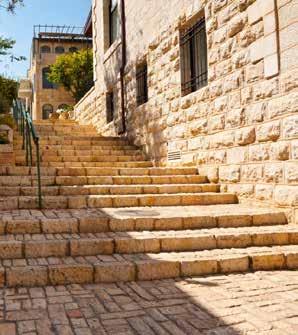
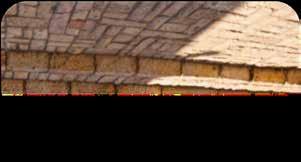




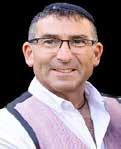




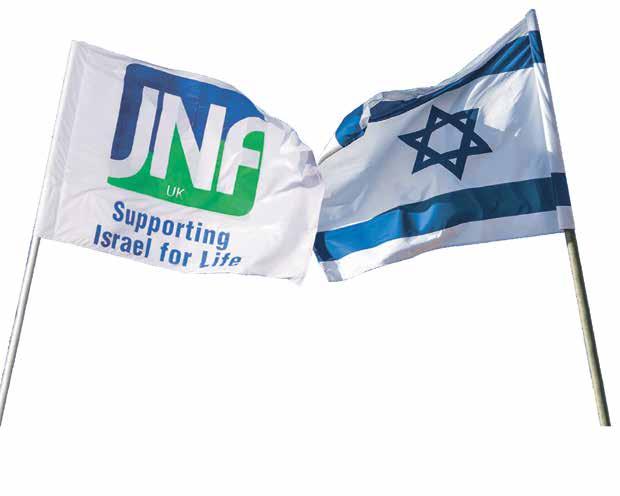
Israelis are still trying to recover from the scale and brutality of the October 7 attacks and subsequent war.
JNF UK is committed to healing, rebuilding and strengthening Israel and its people.


Three men have been charged with terrorism offences over an alleged gun attack against Jewish communities in the north-west of England.
Walid Saadaoui, 36, and Amar Hussein, 50, appeared at Westminster Magistrates Court accused of preparation of terrorist acts to cause multiple fatalities using automatic weapons between 13 December 2023 and 9 May 2024.
Both, who were also allegedly targeting law enforcement and military, entered no plea.
Bilel Saadaoui, 35, pleaded not guilty to a charge of failing to disclose information about an act of terrorism.
Greater Manchester Police arrested the men in Bolton and Wigan earlier this month.
District judge Louisa Ciecóra remanded the men in custody. The case will be heard at the Old Bailey on May 24.
Prosecutor Rebecca Waller said the alleged plan was inspired by the Islamic State group.
CST continue to highlight a surge in antisemitic incidents across the UK.
Northern regional director Amanda Bomsztyk reportedly said: “These are very serious allegations of a plan to commit a terrorist attack against British Jews at a time of record antisemitic hate crime levels. This is one of a number of recent and ongoing cases that demonstrate why the Jewish community needs such extensive security measures and why our continuing partnership with police and government is so vital.”
She added: “CST thanks Greater Manchester Police and other agencies for their work in this case, and we will continue to work closely with police to
provide reassurance and protection for the Jewish community. We urge everyone in the community to continue as normal, remain alert and report any antisemitism or suspicious activity at Jewish locations to CST and to the police.”
Mohammed Amin, Muslim Jewish Forum of Greater Manchester co-chair, reportedly said he was appalled by the allegations of a planned terrorist attack.
“Such alleged crimes are fundamentally un-Islamic,” he said. “The commission of such alleged crimes would inevitably lead to an increase in hostility against other Muslims, despite the fact that almost all British Muslims deplore and condemn such terrorism. This reinforces the vital need for our mission to bring Greater Manchester Muslims and Jews closer together.”
GMP Assistant Chief Constable Rob Potts recognised the case would impact communities in Greater Manchester and beyond.
In a statement, he said: “Everyone should feel safe in our region regardless of their religion or race. We have been working closely with community groups and key stakeholders to address concerns and we’ll continue to update them throughout this case.
“Local officers across Greater Manchester will continue to listen and act on concerns alongside partners to protect the public and keep you safe. The action we have taken so far follows a long-running and carefully managed investigation, and we do not believe that there is a wider risk to the public connected to this case. Should you have any concerns about your safety or any suspicious activity in your area, then I would encourage you to contact the police.”
On Tuesday, Mizrachi UK, in partnership with Bnei Akiva, hosted an inspiring Yom HaZikaron and Yom HaAtzmaut ceremony and celebration at Shrubberies Shul in Manchester.
The event, attended by over 250 people, marked a significant occasion of remembrance and celebration for the whole community.
The evening, hosted by Mizrachi UK and Bnei Akiva Shlichim, Rav Elad & Rabbanit Lani Eshel,began with a moving Yom HaZikaron ceremony led by local Rabbanim, including Rabbi Nir Nadav, Chaplain for the British Army, Rabbi Walker of Heaton Park Shul, Rabbi Chaim Cohen, Head of Yavneh Boys, and Chazzan Adam Caplan of Shrubberies Shul. Rabbi Benjy Rickman, head of Mizrachi in Manchester also gave a moving talk about the power of Yom Hazikaron and Yom Ha’atzmaut. Together, they led the community in heartfelt prayers and reflections.
Bnei Akiva Chaverim solemnly lit candles in remembrance of the fallen soldiers and civilians. A poignant balloon exhibition was on display, showcasing the names and stories of 100 soldiers and civilians who have been killed since the deadly October 7 massacre. This visual tribute served as a powerful reminder of the sacrifices made in the pursuit of peace and security.
Rabbi Benjy Rickman, Head of Mizrachi in Manchester, remarked on the significance of the event, stating, “It was a privilege to celebrate Yom Haatzmaut together with so many people,
singing Hallel together and thanking Hashem for the miracle of Medinat Yisrael.”
The community then transitioned to Yom HaAtzmaut celebrations, including Hallel prayers in honour of Israel’s Independence Day. The evening continued with a festive party featuring delicious shawarma and falafel catered by Celia’s Kitchen, and lively music and dancing led by DJ Gabi Walker.
This week, Mizrachi UK is excited to continue the celebrations with their annual Weekend of Inspiration. The event will bring over 30 esteemed speakers from Israel to educate and engage with over 50 communities in London, Manchester, and Leeds. The weekend will culminate in a Day of Inspiration on Sunday, where communities in Bushey, Borehamwood, Edgware, Hendon, Finchley, Manchester, and South Hampstead will host the educators for a day of communal learning and growth.
For more information on the Weekend of Inspiration, visit mizrachi.org.uk/woi.

Phil Rosenberg has been elected President of the Board of Deputies by the organisation’s representatives, in a vote on Sunday.
Phil, who defeated Amanda Bowman, Sheila Gewolb and Michael Ziff in Sunday’s election, succeeds Marie van der Zyl, who is standing down after serving two terms in the role. He is the Deputy for Brondesbury Park Synagogue and has previously served as Director of Public Affairs at the Board.
Adrian Cohen, Andrew Gilbert and Jeremy Michelson were elected Vice Presidents. As the highest polling Vice Presidential candidate, Adrian Cohen will be Senior Vice President of the organisation. Ben Crowne was elected unopposed as Treasurer.
Board of Deputies Chief Executive
Michael Wegier said: “Three hundred Deputies, themselves elected by their synagogues and organisations, have chosen the President and other honorary officers whom they believe will best champion our community to Government, the Opposition, the media, other faith groups and the general British public. The elections were keenly contested, with candidates travelling around the country to bring their message and vision for the community to a nationwide audience. This is democracy in action.”






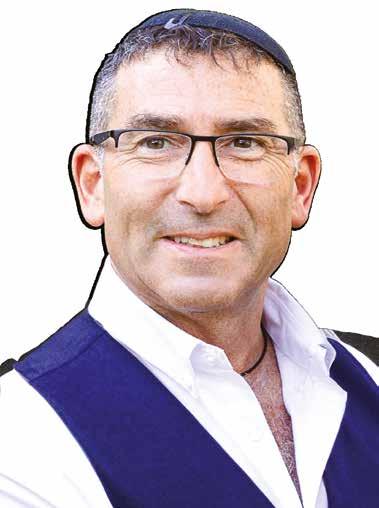





9:45 Welcome
Rav Danny Mirvis
9:50 - 10:35
10:40 - 11:25
11:30 - 12:15
12:20 - 13:10
13:10
14:00 - 14:45
14:50 - 15:35
15:40 - 16:25
16:30 - 17:15
17:20 - 18:05
18:10 - 19:00
The Point of No ReturnLife after 7th October
Rav Menachem Liebtag
The 'stranger' in the Bible - Jew or Gentile? & why it makes a difference!
Rav Binyamin Zimmerman
Lag B'Omer's Message for Bar Kochba's Army and Ours
Rav Benji Levy
My daughter’s liver transplant: How to plan and deal with it when things don’t go to plan
A Shiur with Rav Hershel Schachter
Rav Danny Mirvis
Rav Kook and the football controversy
A Shiur with Rav Hershel Schachter
Rav Jesse Horn
Sefirat HaOmer: A Brisker Perspective
Rav Yosef Zvi
Dr. Carl Hochhauser
Lessons My Patients Taught Me: Insights from the war in Israel and the war
Rav Menachem Leibtag
Counting the OmerAll about Sinai, or all about the Land of Israel?
Dr Tova Ganzel
Chagai: “I am with you, says the Lord”: Divine Presence in Moments of Crisis
Rav Bentzi Mann
Me'afeila Le'ora – The silver lining behind an awful chapter
Michal Santhouse Moshe, how did you become my leader?
Rabbanit Shani Taragin
Chorev, Churva and Charuv: Planting and Praying
Our work since October 7th: Steve Gar, Rav Bentzi Mann, Michal Santhouse, Rabbi Andrew Shaw)
Rav Reuven Taragin
Israel At War: Feeling and Reflecting
Rav Sharon Shalom
The global society between identification and
Welcome : Rabbi Danny Mirvis
Rabbanit Leora Bednarsh
My heart is in the East: Connecting to Israel through prayer
Zvi Rimon - "The IDF - Sparks of Geulah"
Rav Assaf Bednarsh
The Unification of Jerusalem
on cancer
Israel?
Rav Assaf Bednarsh
Pluralism and the Search for Truth
Lunch
Rav Aviad Tabory
Halakhic challenges of a Jewish State
Rav Shlomo Brody
A Tale of Two Sieges: Halakhic Insights into Dilemmas About Civilian Casualties
Rav Gidon Weitzman
Finding Faith in a Complex World
Rav Doron Chitiz
"Tov Lehodot Lashem" (it is good to praise G-d) - what are we thankful for this year?
Santhouse, Nitsana Darshan-Leitner (Moderated by
Devorah Kay
identity
'An eye for an eye' or not? Do we have a choice?"
Rav Benji Levy
The most important part of any journey
Rav Jesse Horn
Moshe and Yosef: A Tale of Two Jewish Princes
Rav Sharon Shalom
What is the cause of antisemitism? A case study of Ethiopian Jews
Rav Gidon Weitzman
A Pidyon Haben in AlabamaDefining the Beginning of Life
Rav Elli Fischer
Israel in Egypt did not change their Name, Language, and Dress: Unpacking a Modern Myth
Jen Airley
Can anyone be a Kohen?
Rav Reuven Taragin
Where Judaism Begins: A Shiur and Book Launch
Dr Tova Ganzel
Chabakuk: “I shout to you hamas! and you do not save?”
Rav Aviad Tabory
The Mitzva of Kiddush Hashem nowadays
Beatie Deutch
Faith, failure and acceptance
Rabbanit Shani Taragin
Redeeming Fields, Families and Festivals
Rav Bentzi Mann

Rav Danny Mirvis
The Kashrut of Whiskey The laws of spirits and the spirit of the law
The Makings of a Holy Army – Halachic questions at times of war


9:45
9:50 - 10:35
10:40 - 11:25
11:30 - 12:15
12:20 - 13:10
Preparing Mekorot for shiur with Rav Hershel Schachter
Rav Hershel Schachter shiur
Rav Reuven Taragin
Where Judaism Begins: A Shiur and Book Launch
Rabbanit Shani Taragin Sticks, Stones and Dry Bones: Revisiting Prophecies
Rav Reuven Taragin
Israel At War: Feeling and Reflecting
Rav Gidon Weitzman Finding Faith in a Complex World
Q&A with Rav Hershel 13:10
14:00 - 14:45
14:50 - 15:35
Beatie Deutch Becoming your Best Self
Rav Jesse Horn Sefirat HaOmer: A Brisker Perspective
15:40 - 16:25 Our work since October 7th - Rav Yosef Zvi
Rav Benji Levy
16:30 - 17:15
17:20 - 18:05
18:10 - 19:00
My daughter’s liver transplant: How to plan and deal with it when things don’t go to plan
Rav Shlomo Brody
Does Halakha Recognize "Quality of Life"?
Great Debates in Medical Ethics
Rav Menachem Leibtag
The 'stranger' in the BibleJew or Gentile? & why it makes a difference!
Rav Binyamin Zimmerman
The IDF's Secret WeaponsAn Army and Arsenal of Torah Scrolls
Rav Elli Fischer
An Intellectual Portrait of Rabbi Nachum Rabinovich Rabbi Sacks' Rebbe
Dr Tova Ganzel
Malachi: “I have shown you love, says Hashem, and yet you ask, how?
Rabbi Andrew Shaw - Welcome
Rav Assaf Bednarsh
The Unification of Jerusalem
Michal Santhouse
ELIAD - One kid, a thousand hearts
Rabbanit Shani Taragin
Chorev, Churva and Charuv: Planting and Praying
Rav Gidon Weitzman
A pidyon Haben in Alabama - Defining the beginning of life
Rav Shlomo Brody
The Creation of Jewish Military Ethics: The debate over "Purity of Arms"
Rav Shlomo Brody
End-of-Life Care: Halakhic information every Jew should know
Hershel Schachter & Rav Yosef Zvi Rimon moderated by Dayan Zobin
Lunch
Rav Menachem Leibtag
Themes in the Bible that explain our Siddur
Rav Doron Perez
Rav Danny Mirvis
Who was left out of Pirkei Avot and Why?
Rimon, Rav Binyamin Zimmerman, Nitsana Darshan-Leitner hosted by Dayan Zobin
Rabbanit Devorah Kay
'An eye for an eye' or not? Do we have a choice?
Rav Binyamin Zimmerman
Lag B'Omer's Message for Bar Kochba's Army and Ours
Rav Benji Levy
The most important part of any journey
Rav Jesse Horn
Uncovering the Deeper Value of Medrash: Lot's Failed Exodus
Rav Shimshon Nadel
Are Yom Ha'atzmaut and Yom Yerushalayim halachic holidays?
Rabbanit Leora Bednarsh
My heart is in the East: Connecting to Israel through prayer
Jen Airley
It's not too late to maximise the power of Iyar
Rav Sharon Shalom
The cause of antisemitism?
A case study of Ethiopian Jews
Rabbanit Leora Bednarsh
My heart is in the East: Connecting to Israel through prayer
Rabbanit Leora Bednarsh
L'shichno Tidrishu: Looking for G-d in All the Right Places
Rav Shimshon Nadel
Too premature to Sing Shirah?
The Song at the Sea and the Miracle of Medinat Yisrael

Rav Doron Chitiz
"There's no way that there is more singing in Gaza than here" music and our fallen soldiers


Dr. Carl Hochhauser
9:45 - 10:30
10:35 - 11:20
11:25 - 12:10
12:15 - 12:55
13:00 - 13:40
9:30 - 10:15
10:20 - 11:05
9:00 - 9:45
9:50 - 10:35
10:40 - 11:25
Rabbanit Rachelle Fraenkel Faith in the Face of Evil
Rabbanit Devorah Kay
'An eye for an eye' or not? Do we have a choice?
Lessons My Patients Taught Me: Insights from the war in Israel and the war on cancer
Rav Doron Perez Israel - Hope in the face of fear
Rav Bentzi Mann – The Makings of a Holy Army Halachic questions at times of war
Nitsana Darshan-Leitner
Gaza. Harvard. The Hague. Fighting the legal street fights for Israel
Rav Benji Levy Planning for a meaningful life and adapting when things don’t go to plan
Rav Doron Perez Israel - Hope in the face of fear
Steve Gar Unity and the Big Bang
Rav Yosef Zvi Rimon
Rabbanit Karen Hochhauser Davening when you are all davened out: How to connect to Tefilla in difficult times.
Rav Aviad Tabory Halakhic challenges of a Jewish State
Beatie Deutch Winning the Marathon of Life
13:00 - 13:55
14:00 - 15:10
Rav Doron Perez Israel - Hope in the face of fear
Jen Airley Life lessons learnt from Sgt Benjamin Airley
15:15 - 15:55
16:00 - 16:45
10:00 - 10:55
11:00 - 11:55
12:00 - 12:55
19:30 - 20:15
Beatie Deutsch Faith, failure and acceptance
Rav Sharon Shalom
"Go go keep going and never stop!" - a personal story
Rav Jesse Horn
Why Choose a Nation? Why Choose Us?
Steve Gar Unity and the Big Bang
Rav Doron Chitiz
"There's no way that there is more singing in Gaza than here" Music and our Fallen Soldiers
Rav Elli Fischer An Intellectual Portrait of Rabbi Nachum Rabinovich, Rabbi Sacks' Rebbe
Rav Shimshon Nadel Is it too Premature to Sing Shirah? The Song at the Sea and the Modern-Day Miracle of Medinat Yisrael
Rav Shimshon Nadel & Rav Doron Chitiz in conversation with Rav Benjy Rickman
Rav Doron Perez Israel - Hope in the face of fear

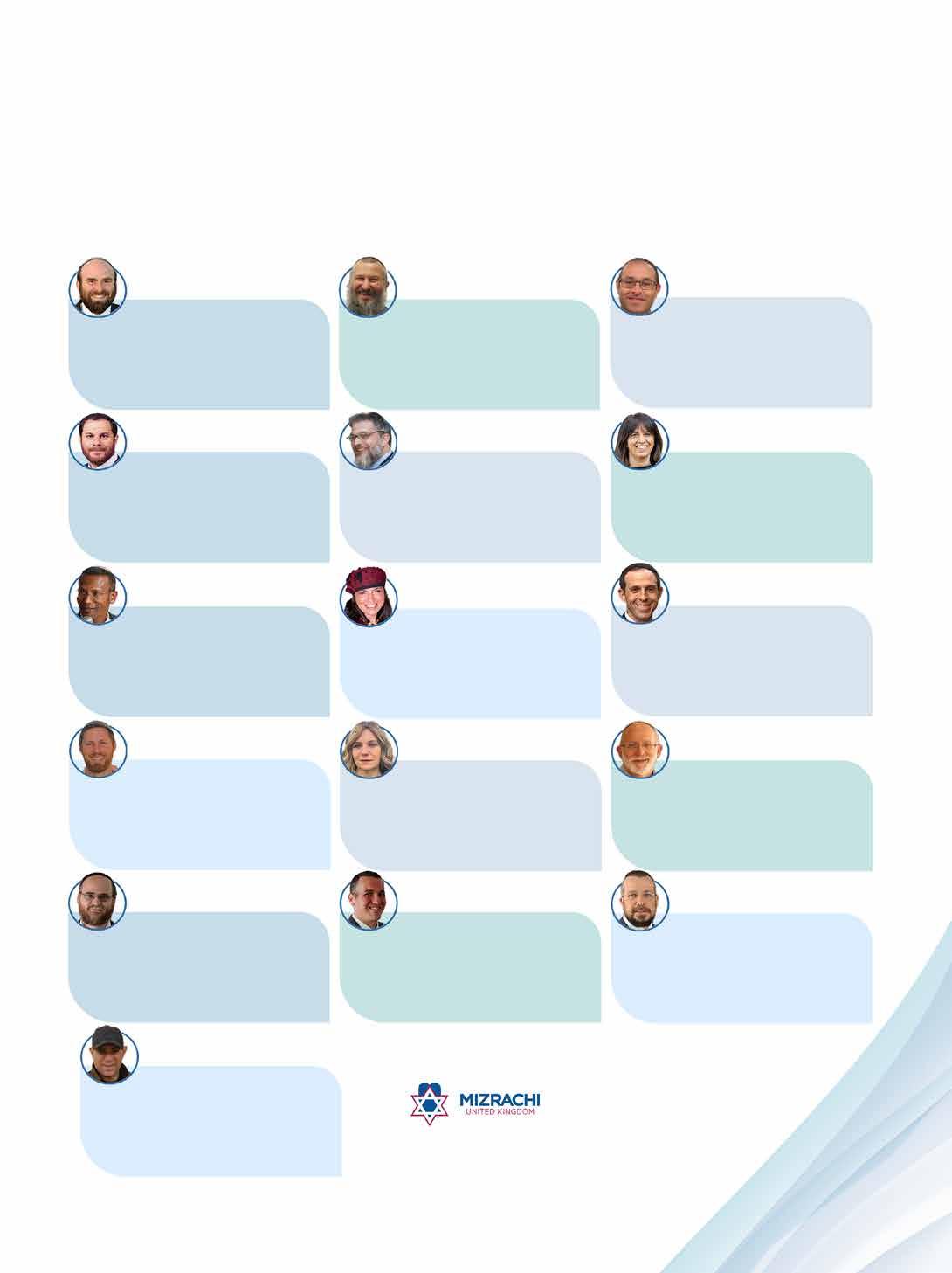

Bnei Akiva UK once again proudly hosted its annual Yom HaZikaron and Yom Haatzmaut tekes, commemorating the solemnity of Memorial Day and the jubilation of Independence Day. With a record attendance of over 1200 for the Service and more than 400 participants at the celebratory dinner, the gathering served as a poignant testament to the unity and resilience of the community.
The solemn proceedings of Yom HaZikaron were marked by heartfelt speeches from esteemed guests, including Chief Rabbi Mirvis, Ambassador Tzipi Hotovely, and the Bnei Akiva Mazkira, Abi Laderman.

Miss Laderman said “In Bnei Akiva our role is very simple. We are educators. And
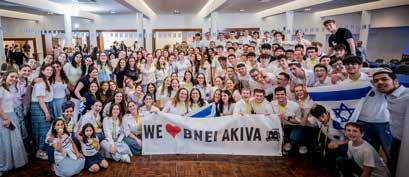
Bnei Akiva knows that Jewish education, that creating young people with a strong and proud identity, is how we will defeat those who try to destroy us. It is this enduring and confident, but not arrogant, identity, that will ensure that Am Yisrael will win, every, single, time. There is no price on knowing who you are, on knowing that you are supporting good and on
knowing what you believe in.”
Their poignant words resonated deeply, honouring the sacrifices made with special mention of the tragedy of October 7th for the nation and reminding attendees of the enduring spirit of unity and solidarity.
Transitioning from remembrance to celebration, Yom Haatzmaut festivities were characterized by joyous solidarity and spirited festivities. The highlight of the evening was the moving and uplifting Hallel lead by Chazan Jonny Turgel, which reverberated with the fervor of national pride and gratitude for the miraculous journey of Israel. Miss Laderman commented, “The ruach at Bnei Akiva’s annual Yom
Hazikaron and Yom Ha’atzmaut ceremony was, as usual unparalleled with an additional level of emotion pouring from our hearts in reaction to the atrocities of October 7th. From the heartfelt and deeply moving Yom Hazikaron ceremony, to an incredibly uplifting Hallel from Chazan Jonny Turgel to a fantastic party downstairs with music from Eitan Freilich, it was incredible to see the whole community brought together.”
Bnei Akiva extends heartfelt gratitude to all participants, volunteers, and supporters whose dedication and commitment made this year’s event a resounding success. As we reflect on the past and embrace the future, let us continue to cherish the values of unity, remembrance, and celebration that define our community.

Everything in this world could be better with more women doing it, Cherie Blair tells audience at Norwood
Seventy female philanthropists attended the second Norwood Women in Philanthropy event at a Central London art gallery on Thursday, where they enjoyed a networking reception before hearing from an esteemed panel of female philanthropists including Cherie Blair KC, CBE and Anne Josse, founder of Prism the Gift Fund.
The reception followed last year’s highly successful inaugural event which once again examined how women can best advocate for community-basic philanthropic causes, as part of the charity’s emerging female philanthropic infrastructure. Last year’s event featured panellists philanthropists Dame Gail Ronson and Nicole Ronson Allalouf, and fundraising consultant Nicky Jones.
Introduced by Norwood Chief Executive Naomi Dickson, journalist Nicole Lampert chaired the event.
Cherie Blair talked about how her background has influenced her choices: “I go back to my passion, which is women. I was brought up in a female household with my sister, grandmother and mother. My mother didn’t have the opportunities I had in education and her career came to an end when she had children. That taught me how important it is for them to
support themselves, because who knows what will happen. The strength of women always inspires me.”
Referencing her role as Norwood’s Patron of Children Services, Cherie added: “Disability is still one of the least appreciated forms of discrimination. It’s all about what you can’t do not what you can do. Partly because of my faith-based upbringing, I always thought (charity) was something you should do.”
responsibility today”.

Anna Josse spoke of the need to establish ‘building blocks’ to open up funding for philanthropic causes: “When people ask how you raise money and find donors, I say it takes many years of hard graft. Money doesn’t fall from the sky.” On her own experience of establishing Prism the Gift Fund, she added her aim was to “enable more money to get into the sector. We educate clients in the importance of philanthropy, that it’s key to their
Both agreed that the ability to govern a charity responsibly has been further impacted by the current challenging economic times. “If you have a passion and a great project, you need to bring in the money and that takes time,” said Anna Josse. “You need a trustee who can open up new opportunities, bit by bit. There’s no magic wand,” she added.
Cherie Blair
added: “Sometimes, rather than starting a new charity and competing for limited funds, find a charity with a shared mission and come together to see what you can achieve. There’s strength in numbers, you don’t need to reinvent the wheel.”
Nicole Lampert asked panellists their thoughts on the role of faith-based charities in sustaining their communities. Cherie Blair responded: “People of faith have more in common with each other. I’ve always had an affinity with the Jewish
community. But also because of my extensive work in disability. I loved the positive and practical nature of the work Norwood does so well.”
Speaking of the value of a female philanthropic network, Anna Josse said: “My closest friends are from my Jewish youth movement days and it’s very powerful to have a group of women going out into society and supporting each other.”
“Nothing in this world wouldn’t be better with more women doing it,” concurred Cherie Blair.
“Every single one of you can make a difference,” Cherie Blair added. “Never believe your individual actions can’t make a difference. That’s the wonder of democracy. It’s a cumulative effect that really can change things. Each of us doing what we can to make the world a better place - it really does work.”
Alongside the networking reception and lively panel discussion, a raffle was held, and 300 limited edition prints donated by artist Charlotte Posner were available to buy, with the proceeds going towards supporting Norwood’s vital services for people with learning disabilities and autism and children and their families facing challenges.

Members of Kisharon Langdon met at Maccabi House for a poignant Yom Hashoah commemoration.
The event was facilitated by members and their families.
The evening was filled with readings of poems and short stories including personal family anecdotes, evoking a deep sense of emotion.
Yellow candles were lit in remembrance
culminating in a stirring rendition of Israel’s national anthem. The event showcased the charity’s commitment to person-centered programmes and highlighted the exceptional teamwork with community services departments. The event was a powerful testament to the strength of community and remembrance.
The Brent Athletics event witnessed outstanding performances from JFS pupils.
In the Year 7 category, Joely Phillips claimed victory in the 1500m final, Sam Gilbery-Phillips soared won the high jump, clearing 1.47m, Maya Weisberger dominated the shot put, securing first with 6.32m. Not to be outdone, Mathilda Cowan sprinted her to victory in the 300m final.
The Year 8 team also displayed their prowess with a string of victories.
Gideon Kramer blazed to first in the
100m and Alfie Cohen conquered the 1500m. The relay team of Cohen, Binun, Kramer, and Bentley clinched gold in the 4x100m relay.
Year 9 saw Annabel Banyard win the 300m final, Eden Baron’s powerful shot put earned her second place. The Year 10 squad concluded the event on a high note with Josh Amponsah breaking records in the 100m final and Alon Taylor in javelin.
JFS participants have set a high standard for future competitions.
As anticipation builds, more than 50 daring and passionate individuals have stepped up to the challenge of walking on hot coals in support of Seed, a family-focused educational charity dedicated to enriching Jewish life and empowering parents.
Seed’s programs reach thousands of people across the UK every year, imparting the richness of Jewish heritage while equipping parents with essential life tools to foster their children’s self-esteem and nurture an authentic understanding of Judaism.
CEO Rabbi Herman, emphasised the
significance of the coal walking event, stating: “Walking on hot coals is all about the power of belief - belief in ourselves and belief in our own ability to overcome challenges. We felt this was particularly relevant given the current situation.”
The coal walking event promises to be a powerful symbol of self-belief and growth, capturing the spirit of Seed’s mission to inspire positive change within families and communities.

King Charles III is to continue as Royal Patron of JLGB.
The announcement comes as he marks the first anniversary of his Coronation.
The Jewish Lads’ and Girls’ Brigade is the UK’s oldest Jewish youth organisation. The decision follows a review of over one thousand organisations under the patronage of the late Queen, the former Prince of Wales and Duchess of Cornwall.
Established in 1895, JLGB has been a pivotal part of the fabric of the Jewish community. The reconfirmation of King Charles as Patron highlights his commitment to community support at the heart of JLGB’s mission.
Neil Martin, JLGB CEO stated: “We are profoundly honoured that the King has chosen to continue his patronage with JLGB. As we approach the 130th anniversary of our founding in 2025, this royal endorsement not only recognises our historic contributions but also
reinvigorates our resolve to empower the next generation of children and young people.”
The Royal Patronage comes at a time when the resilience, belief and potential of young people are crucial to overcoming challenges posed by recent global events including the pandemic and rising antisemitism.
The King’s support serves as a cornerstone for future initiatives aimed at fostering positive youth engagement and social cohesion.
JLGB invites the public to support ongoing efforts to provide inclusive, impactful programming for Jewish young people across the UK.

The London School of Jewish Studies (LSJS) marked Yom Hashoah with a special free event featuring Anita Peleg, the daughter of renowned Holocaust survivor and artist Naomi Blake. Anita told her mother’s remarkable life story, to a large in person and online audience, at the event which is part of LSJS’ Summer term. One of Naomi’s bronze resin sculptures, featuring the words ‘Nizkor’ (‘we will remember’) was given to LSJS in 1992.
Anita told of how her mother was born Zisel Dum, in Mukacevo, Czechoslovakia, and was deported to Auschwitz with her family. Naomi and her sister worked at a munitions camp where POWs showed them how to sabotage German bombs.
After the war, she boarded an illegal ship to Mandatory Palestine, where she joined the Palmach but was shot in the neck by a British soldier. While recovering in hospital, she began carving small figurines which became a passion.
After marrying her husband, Asher Blake, Naomi moved to north London and went to art school. Much of her work has focused on the expression of her experiences, although her pieces are principally optimistic and positive.
Her sculptures, which were portrait and moved to abstract forms over the years, aim to help keep alive the legacy of the Jews murdered in the Holocaust. They also promote Naomi’s vision for uniting faiths and building understanding between religions as well as her hope for the future. Anita recalled her mother saying
that ‘she carried Auschwitz in everything I do. It never leaves. I am subconsciously influenced by my past. It’s the people that didn’t survive that are on my mind; not what I went through. “
Her work has been exhibited in galleries in the UK and overseas, and her sculptures are permanently displayed in locations in London and at the University of Leicester, Bristol Cathedral and the Holocaust Centre in Nottinghamshire among others.
Anita said “It was really meaningful to give a talk to an audience with my mother’s sculpture standing right outside. She would be very proud to see that her sculpture is still here helping people remember such a dark chapter of our history.”
Anita has published two books about her mother and is the Chair of Trustees for Generation 2 Generation (G2G), a Holocaust education charity which empowers second and third generation Holocaust survivor descendants to present their stories to a wide variety of audiences. “We are extremely honoured that our campus is home to one of Naomi Blake’s sculptures“, said Joanne Greenaway, Chief Executive of LSJS. “It was such a privilege for us to hear Anita’s talk about her mother’s inspirational life and to learn the story behind the sculpture and the artist.”
The event kicked off LSJS’ Summer term, which is packed with courses, tours and events as well as Ulpan with classes at all levels.




•
•
•
•
•




Dear Rabbi
I struggle a lot lately with anxiety. I am not sure why. Life is good thank G-d and while I have my struggles like everyone else, I find myself worrying about what lies ahead. I also find myself looking back a lot and wondering how I might have done things differently in life. I don’t know if it is an age thing or just something I need to learn to deal with. I am not asking you for some psychological help, but I would welcome some Jewish philosophical guidance please.
Shimon
Dear Shimon
When the yetzer hora (evil inclination) keeps asking you to look in the past there is something in the future he doesn’t want you to see. He is trying to frustrate you because he knows G-d is going to help you win this battle. He wants you to worry about what’s next so you can’t enjoy what’s now. He’s looking to deceive you. Stop worrying. Focus on G-d and enjoy every single day He has given you. If you look back you will see that every situation G-d has brought you into, has
either changed you, helped you grow, made you stronger, taught you a lesson or made you a better person. Everything He does has a purpose and His plan for you is always the best even if you don’t always see it. Sometimes the process is painful and hard but don’t forget, even as you perceive Him to be silent, He’s still doing something for you. Trust the plan and remain unphased. Above all else remember: The past is history; the future is a mystery but today is a gift. It’s why we call it, the “present.”
Dear Rabbi
I hope it is OK to air a grievance. I am in my mid-sixties and sadly lost my husband about a year ago. Since then, many of the friends that my husband and I socialised with simply disappeared. They were in touch as the beginning and then drifted. I still have some solid friends, but I feel very hurt by those that are no longer in touch. It seems so out of spirit with the way Judaism speaks of treating the widow, and not in keeping with community.
Sandra

Dear Sandra There are three types of people. There are “leaf people” who come into your life just for a season. They come and take but as soon as it gets cold or a wind blows through your life, they are gone. Then there are the branch people. They are stronger than the leaves. But sometimes you must be careful with them before you run out and choose to put all your weight on them. They may stay with you longer, through a few seasons, but when life becomes tough, they too seem to often break away. Finally, there are the root people. They are very important. They don’t do things to be seen. They only wish to support you and help you live a strong and healthy life. Even if you go through a difficult time they will always be there, to hold you up, because they accept you just the way you are. Those are the ones that matter most.

strength and made huge sacrifices in doing so.”
Dear Rabbi
This week was Yom Hazikoron. It is an especially sad day this year with all the terrible loss of life since October 7th. How can we find comfort and solace at such a difficult point in our history?
Avishai
Dear Avishai
Israeli poet Tzur Erlich reflecting on the proximity of Yom Hashoa - Holocaust Remembrance Day last week, and Yom Hazikoron – Israel Memorial Day this week, penned the following: “Yom Hazikaron is about the terrible price we pay for having a State of our own; Yom Hashoah is about the terrible price we paid for not having a State of our own.”
Chief Rabbi Sacks once observed: “The Hebrew language has two words for strength: Koach and Gevurah. Koach is the strength you need to win a war. Gevurah is the courage you need to make peace. Israel has shown both kinds of
It’s easy to be pessimistic. We’ve endured the single biggest loss of Jewish lives in a day, since the Holocaust. We wonder when will it all end? So, it’s easy to be pessimistic. But being pessimistic never got us anywhere. If there is anything we can learn from history it’s that we have a tremendous knack for survival. We simply know survival better than any other nation. You cannot deny that as we go around Israel we see a country that has taken every curse thrown against it and turned it into a blessing, by leading the fight against terror, by becoming world experts in treating PTSD, by bringing disaster relief wherever it is needed. And it is a country that sets an example to the world, by developing agriculture to grow food where no food was ever grown before; by developing medicine to heal sicknesses that were not healed before; by developing technology to create human possibilities that did not exist before. That is the reality that is Israel. I therefore prefer to be an optimist because we Jewish people are the same. We have and we will always endure.
Rob and Jennifer Airley, tragically lost their son, Binyamin, in the early stages of the war last October. He was 21 years old and a natural, inspirational leader. He loved Torah, he loved Israel and often volunteered on a farm working as a shepherd and guarding the area.
Rob and Jen are completing the building of Beit Binyamin, a retreat home for IDF soldiers, bereaved families and others in need of respite and therapy. It will offer professional programming, wholesome food and spacious, comfortable rooms in the beautiful and spiritual city of Tzfat.
Donate today at https://causematch.com/BeitBinyamin/437872 or email office@thejewishweekly.com

 BY RABBI SHMUEL REICHMAN
BY RABBI SHMUEL REICHMAN
Imagine a teenager lying on a grassy field, gazing into the night sky. As he stares up at the stars, he thinks to himself, “Look at how enormous the universe is. The sky just expands endlessly... It must go on forever.” After sitting with that thought for a few moments, he becomes uncomfortable. “How can anything go on forever? Everything must stop eventually.” But after a few moments of relaxation, his thoughts intrude again. “But how can the universe stop? What exists on the other side when the universe ends? It must go on forever...” And this inner dialogue continues as he struggles to contemplate the infinite within his finite mind. This struggle is not a childish one; it is a challenge that confronts any finite being who tries to connect to the infinite.
Younger children, however, do not face this struggle. They are dreamers, living in a world of fantasy where anything is possible. Just ask a group of children what they want to be when they grow up, and you’ll get some of the most fantastic, unrealistic responses imaginable. “I’m going to be an astronaut fireman, so that I can save people on the moon,” or “I’m going to become a great tzaddik and learn how to speak every language so that I can teach Torah to everyone.” Children live within the infinite, the realm of endless possibility. However, as we grow up, we begin to experience the struggle of reality, where our notions of the infinite start being challenged. We then face the question: How do we, as physical and limited beings, transcend our finite dimensions? How do we relate to the abstract, to the infinite, to the spiritual? Let us approach this question through the lens of sefiras ha’omer, the counting of the omer.
We are commanded to count the days between Pesach and Shavuos, a period known as sefiras ha’omer (Vayikra 23:15–16; Devarim 16:9). At first glance, this can be understood on a very simple level: As we approach Shavuos, we excitedly count down to Matan Torah as we anticipate our acceptance of the Torah. This can be compared to a countdown toward a wedding, a vacation, or some other exciting event. However, there is a feature of the sefiras ha’omer count that is markedly different: Rather than counting down toward the destination, Shavuos, we count up from the starting point, Pesach. We don’t mark how many days remain until Shavuos; we count how many days have elapsed since Pesach. What is the meaning behind this strange method of counting? And more generally, what is the purpose of counting in the first place? By no other holidays do we count the days between them; we don’t
count the days between Sukkos and Chanukah. Why then do we specifically count the days between Pesach and Shavuos?
In truth, we are not counting down to Matan Torah, but rather are building toward it, ascending one day at a time. We do not wait for Shavuos to arrive; we actively bring it ourselves through the time and effort we invest as we count the omer. If Shavuos — and its accompanying Matan Torah — are a skyscraper, each day of the omer is a brick. Each day we place the next brick in our building, and each day we build ourselves one step higher. The extensive halachic emphasis on counting each and every day of the omer highlights the fact that every single brick is essential and that every single day is fundamental (Tosafos, Menachos 66a). If while building a staircase you miss one step, you simply cannot build the next step up. Each step requires a foundation to rest on. The same is true of counting the omer. Each day builds upon the previous ones, ascending toward our ultimate destination. Matan Torah does not come after forty-nine days, it comes because of them, built by our effort and investment during sefiras ha’omer. This is why we count up. We are not counting down to Matan Torah; we are building up toward it, one day at a time.

— are not tied to a specific day (the sixth of Sivan); it is the result of the forty-nine days that we count. The fiftieth day, the day of Shavuos and Matan Torah, emerges from the forty-nine days of counting. We bring it into existence. This is why the holiday of Shavuos literally means “weeks” — the seven weeks that we count create the holiday of Shavuos. (Shavuos also shares the same root as the word sheva (seven), reflecting the seven weeks that creates the chag of Shavuos.)
Just like the teenager in the introductory story, we all struggle to connect with the infinite; to see the spiritual within the physical; to find genuine meaning and purpose in an often turbulent and chaotic world. It can feel overwhelming — if not impossible — to build a skyscraper; the task is quite daunting. However, the key is to have the ultimate goal in the back of our minds while we focus on each individual day, trying our best to place each individual brick perfectly while we build
toward our ultimate destination. Each day of the omer is a new brick — a new part of our journey toward Matan Torah, toward the infinite, and toward marrying Hashem. May we be inspired to create something magical as we build toward Matan Torah, one day at a time.
Rabbi Shmuel Reichman is a bestselling author, international speaker, and the CEO of Self-Mastery Academy. He has lectured internationally on topics of Torah thought, Jewish medical ethics, psychology, and leadership. His bestselling book, The Journey to Your Ultimate Self, serves as an inspiring gateway into deeper Jewish thought. He is also a business, executive, and leadership coach, with a unique approach based on Torah values. After obtaining his BA from Yeshiva University, he received Semicha from Yeshiva University’s RIETS, a master’s degree in education from Azrieli Graduate School, and a master’s degree in Jewish Thought from Bernard Revel Graduate School. He then spent a year studying at Harvard as an Ivy Plus Scholar. He currently lives in Chicago with his wife and son where he is pursuing a PhD at the University of Chicago. To enjoy more of Rabbi Reichman’s content, to contact him, or to learn more about his services, visit his website: ShmuelReichman.com
This elucidation of sefiras ha’omer sheds light on the Ramban’s enigmatic approach to the counting of the omer. He maintains that women are obligated to count the omer because it is not a mitzvas aseih she’ha’zman grama — a time-bound commandment. How are we to understand this? Sefiras ha’omer, the counting of each specific day between Pesach and Shavuos, seems to be the epitome of a time-bound mitzvah!
However, a deeper understanding of sefiras ha’omer clarifies the Ramban’s opinion. In general, a time-bound mitzvah is an opportunity to tap into a certain power of time that exists at that moment. On Pesach, when we eat matzoh, we tap into the power of freedom, a pre-existing reality. This same principle applies to all time-bound mitzvos. For sefiras ha’omer, however, we don’t tap into a pre-existing time; we create time. When we count the omer, we do not tap into the reality of the omer, we create it. Time does not create the omer; we do. This is why there is no specific date mentioned for Shavuos in the Torah. Shavuos — and Matan Torah


A large 4 bedroom linked detached house on Mayfield Gardens in the Shirehall Estate offered chain free Plenty off street parking, decent garden & lots of potential subject to planning Viewings are highly recommended 020 - 3633 - 8567
Offers in excess of £1,550,000 Mayfield Gardens, NW4

Iyar is the only month where the religious experience today is the opposite of what it was designated to be in Biblical times.
Iyar in the Torah was designated as a month of total anticipation and elation as we count up to the receiving of the Torah. The Sefer HaChinuch tells us that each day we count signifies a step of growing excitement as we prepare to re-experience our rendezvous with Divine revelation.
Yet, Jewish experience in the 2nd century changed all this, and it is now primarily a time of pain, tragedy and mourning. The sudden and tragic death of the 24,000 students of Rabbi Akiva, which happened predominantly in the month of Iyar, sharply altered the religious and emotional experience of this month.
Why did this particular tragedy, as opposed to so many other tragic massacres, evoke a time of collective mourning for future generations?
Undoubtedly, the death of such a large quantity and quality of Talmudic scholars effectively resulted in the decimation of Torah learning in Judea – an enormous tragedy in and of itself. But there is a twist in the plot. Although the Talmud mentions that they died of a disease called “askara,” perhaps diphtheria, Rav Shreira

Gaon maintains that they died as a result of “shmad” – a religious war. This means that they died during the Bar Kochba rebellion, as this was the only religious war at that time. Not sickness alone, therefore, caused this destruction but rather their death at the hands of the Romans.
Understanding the depth of the tragic failure of the Bar Kochba rebellion is crucial to understanding the depth of the loss and mourning that ensued.
The fall of Beitar and the vanquishing of the rebellion is one of the greatest tragedies of Jewish history. The Rambam goes as far as to say that this loss was as tragic as the day of the destruction of the Temple itself. Why?

G-d instructs Moshe to tell the Kohanim not to come into contact with a corpse, with the exception of when burying specific close relatives. They are not allowed to shave their heads or wound themselves during a mourning period (Rashi). There are restrictions on whom Kohanim can marry. There is a mitzvah to show Kohanim specific forms of respect (Rashi). A Kohen Gadol is not allowed to bury a close relative, nor marry a widow.
2ND ALIYA (LEVI) – 21:16-22:16
Specific types of physical blemishes on a Kohen disqualify him from bringing offerings in the Temple; however, he may still eat from the offerings. A Kohen who is ritually impure (tamei) can neither bring nor eat an offering until he is pure (tahor). The laws of terumah, the first crop tithe given to the Kohanim, are stated. Whilst this tithe should not be eaten by a non-Kohen, a Kohen’s wife and his Cana’anite servant are permitted to eat it.
22:17-33
Offerings brought to the Temple must be free of certain blemishes which disqualify them. An animal cannot be brought as an offering until it is at least eight days old. Offerings have to be eaten within a certain time. There is a mitzvah to sanctify G-d’s Name.
4TH ALIYA (REVI’I) – 23:1-22
Because of both the unparalleled loss in human terms as well as the devastating impact of these events on the national psyche. Historians at that time write that, in terms of human loss, the Bar Kochba rebellion was even more tragic quantitatively than in the Churban of Yerushalayim 65 years prior.
An additional element is that while many were killed and exiled, and Jerusalem and the Temple were destroyed, the vast majority of Jews remained in Judea, building thriving communities with the Sanhedrin relocating to Yavneh. There was still hope for an imminent rebuilding of Jerusalem, just as it had been rebuilt following the previous 70-year Babylonian exile. Indeed, this was the aim and

hope of Bar Kochba’s rebellion, supported by Rabbi Akiva. However, with the horrific fall of Beitar, a new period in history was ushered in. Judea was laid waste, the national infrastructure was destroyed and hope for imminent return was lost. This exile would be longer.
Iyar, the great month of spiritual exhilaration, was turned into a darker time of mourning for the destruction of the Torah world, and the loss of hope of the return to Jerusalem.
In the modern era, the month of Iyar has begun to be redeemed!
In addition to Lag BaOmer on the 18th of Iyar, we have two new modern miracle days of exhilaration – both signifying the beginning of redemption. The 5th of Iyar – the miraculous establishment of the State of Israel, and the 28th of Iyar – the liberation of the Old City of holy Jerusalem. Baruch Hashem, Iyar is slowly returning to its former glory from days of mourning of ‘Sefira’ to days of ‘Sefirat HaOmer’ – the anticipation with exhilaration of the wheat offerings in the Temple and the collective national acceptance of our treasured Torah.
Yom HaAtzmaut Sameach and Shabbat Shalom!
Rabbi Doron Perez is the Executive Chairman of World Mizrachi. He will be in Finchley and Edgware this Shabbat for ‘The Weekend of Inspiration’.
Laws of Shabbat and the festivals are listed. On Pesach, which lasts seven days, we eat matzot. The first and last days are Yom Tov, on which we refrain from specific prohibited activity (melacha). On the second day of Pesach, the barley Omer offering is brought. There is a mitzvah to count 49 days from 16 Nisan (the second night of Pesach) until the night before Shavuot. On Shavuot itself, the double bread wheat offering (shtei ha’lechem) is brought and melacha is forbidden.
ALIYA (CHAMISHI) – 23:23-32
Rosh Hashana is called ‘a day of shofar blasts’. Yom Kippur is a day of fasting. On these days, melacha is also forbidden, but the punishment for doing melacha on Yom Kippur is more severe.
On Succot we take the four species (arba’a minim) and dwell in temporary booths (succot). The seven days of Succot
are followed by Shemini Atzeret. On the first day of Succot and on Shemini Atzeret, we refrain from melacha.
Moshe is told by G-d to instruct the people to bring pure olive oil for the daily Menorah lighting in the Mishkan (Tabernacle). Moshe is commanded to provide flour for the showbread (lechem hapanim) that is placed on the table (shulchan) and remains there for an entire week. A man is caught blaspheming and is sentenced and put to death.
Point to Consider: Who was the father of the blasphemer? (see Rashi to 24:10)
HAFTARAH
The prophet Yechezkel (Ezekiel) details the halachot which will pertain to Kohanim in Messianic times. Some of these laws are more stringent than those listed in the sidra.
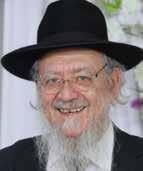 BY RABBI YAKOV SCHONBERG
BY RABBI YAKOV SCHONBERG
A kinyan is an act of acquisition recognised by Torah law as legally binding and Bava Metzia 74a is the only place in Shas where kinyan situmta is briefly mentioned. Although rarely mentioned in early poskim, it has widespread application in many modern situations. Traditional modes of acquisition may not always be practicable but situmta or minhag hasochrim –commercial convention could be usefully employed to make a halachic transaction.
First, what does ‘situmta’ mean? Biur Hagra (CM-201:1) references Targum Yonason, Bereshis 38:18 as a source. The signet that Yehuda gave to Tamar is called ךמתח, translated as ךתמוטיס, your seal, whereas Targum Onkelos translates it as אתמוטיס .ךתקזע is related to םתס meaning to close and seal a deal, whereas אתקזע is a clasp or ring. It is interesting to note that in the Megilla (Esther 3:10,12) the king passes authority to Haman by removing his תעבט, which targum translates as אקנפשוג. Yet when the king later (Esther 8:2) removes his ring and transfers that authority to Mordechai, תעבט is translated by targum as אתמוטיס אתקזעד. Why the change from אקנפשוג to אתמוטיס?
Seals were used extensively in ancient times to identify ownership and to validate documents like a signature today. Seals enabled kings to delegate power to executives to carry out treasury function on their behalf as they did not get involved in day-to-day business across their kingdom. Their own personal signet was more a form of royal jewellery (אקנפ-שוג – an embellished stone), used to stamp royal decrees and statutes rather than financial transactions. State administrators used stamps and cylinder seals bearing the royal emblem, plus the official’s full name, often with artistic depictions of their ruling gods, carved into stone or metal cylinders. As they were engraved semi-precious stones, many have survived until today and rolling them in clay reproduces the seal, as illustrated. Haman and Mordechai did not receive the king’s personal ring, as that carried the authority of the king, which he retained for himself. Removal of the ring implies that he transferred responsibility to manage the affairs of state,
and the seals used by Haman and Mordechai as Treasurer would have borne the royal crest with their personal names. We can suggest that the different targumim reflect that Mordechai would have focused on the treasury function of the seal – אתמוטיס – rather than the exquisite jewellery אקנפשוג aspect. Many ancient seals have been excavated bearing officials’ names with royal crests which attest to this practice. Rashi owned a winery and was familiar with the shop-keeper’s practice of marking wine barrels with ownership seals while storing them in his wine-cellar – providing an excellent example of the original situmta seals.
When discussing a deal, it is often difficult to ascertain when the parties have closed their negotiations and can no longer retract. An act of kinyan fixes when commitments become legally binding. Different modes of kinyan, such as meshicha, hagbaha and chatzer are effective depending on the situation but they are independent of local custom. Some may be binding only Rabbinically and that would be problematic if the transaction needs to be binding according to Torah law, such as with the sale of chametz. Rashba explains that kinyan situmta in our gemora is binding because financial obligations are transacted according to local custom and לטבמ גהנמ הכלה – it overrides normative halacha which requires specific acts of kinyan. That means this mode of kinyan cannot be utilised universally, but only in locations where that custom operates. Rashi’s example of stamping wine-barrels involves no recognised act of kinyan, yet it is effective because it was the established practice in France. Ritva challenges this approach and refuses to accept that there can be any method of acquisition outside those fixed by Torah or instituted by Chazal. Ritva therefore suggests that situmta involved handing over of a token to indicate finalisation of a transaction and kinyan situmta operates under the heading of kinyan chalipin, the token acting like a sudar. Ritva is a minority view and poskim generally accept that situmta operates outside regular kinyanim.
Nesivos Hamishpat (CM-201:1) writes that Chazal introduced acceptance of local custom and as a rabbinic institution, it would not be effective for Torah obligations. However, Rashba stated הכלה לטבמ
- that it works even for Torah obligations. If it is not a rabbinical institution, what is its operational basis? Chasam Sofer (YD-314) explains that merchants can transact business with any
conditions that they wish to impose on themselves, and accepted business custom then becomes an implied condition, which is effective for Torah obligations. His case was the sale of a pregnant cow to a non-Jew to avoid bechor redemption, a Torah requirement, and the sale was clinched with a handshake in combination with “mahritsch’, drinking liquor, the local market custom for selling animals. Mishnah Berurah (Biur Halacha-448:19) quotes this Chasam Sofer in connection with selling chametz using a handshake as a possible Torah kinyan but writes to rely on it only in combination with another kinyan because of uncertainties.
It is an established halachic principle that one cannot make a kinyan on רבד
– something not yet in existence. A kinyan has to take effect on an article at the time it is made, so kinyanim cannot work for future acquisitions. There is a machlokes Rishonim brought in Mordechai (Shabbos 473) whether that principle applies to kinyan situmta. Rosh (Shut 13:20) asserts that situmta is effective even for םלועל אב אלש רבד. Chasam Sofer (YD-66) rules affirmatively but Ketzos Hachoshen (CM-201:1) writes that it is like any other kinyan and does not work. As it remains a machlokes, one who is muchzak can claim ‘kim li’ (Minchas Shlomo-II:69). Rabbi Asher Weiss (Minchas Asher-Parshas Toldos) suggests the basis for this machlokes by analysing the nature of this kinyan. One approach is that there is an inner logic as to why Torah kinyanim work and there is no reason why one should not be able to add further actions. A second approach is to accept that one cannot add to Torah kinyan acts, but one can achieve a similar result without a technical action. Transfer of ownership takes place when the buyer and seller have gemiras daas, conception that conveyance has taken place. If it is self-evident that there has been a transfer of ownership, then ידהס ןנא that a meeting of minds has occurred. Therefore, it is possible that situmta is not regarded as an act of kinyan and operates because it is established that there was a meeting of minds, and no further act is necessary. Now, if we regard situmta as an act of kinyan, then it would not help for
because there is no object present to act on, like with other kinyanim. However, if situmta functions to produce a meeting of minds, then that agreement may be effective even without presence of the object.
With the advancement of technology, business transactions have developed
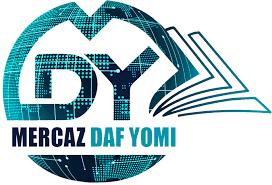
making conventional halachic principles often irrelevant to new situations. Many online transactions involve situations where the seller does not yet own the item being sold and is a problem of selling
. Sometimes the merchandise cannot be identified, or it is intangible, which does not allow for regular kinyanim. Situmta provides halachic basis for internet purchases as it validates commercial convention. If clicking on the credit card pay button finalises a sale according to accepted custom, then that is regarded as kinyan situmta and is halachically binding. This may pose a problem to keeping one’s website open for sales on Shabbos, when sales are being transacted on Shabbos. Without delving into issues of mekach umemkar, sechar Shabbos and zilzul Shabbos, some poskim want to compare this to automatic vending machines which Minchas Yitzchak (3:34) permitted subject to a number of conditions. Where one is selling on someone else’s website, one has to consider the Terms and Conditions of the website. Amazon sales are not considered as legally finalised until the goods arrive at the customer’s doorstep and therefore there is no effective sale on Shabbos when the customer clicks on the credit card confirmation. With regard to one’s own website, although some poskim (Ratz Katzvi:Shabbos-24 and Kovetz Or Yisrael-35) provide heterim, Shevet Halevi (10:57) ruled against it but permitted leasing the site to a non-Jew over Shabbos in cases of extreme emergency. Rabbi Yona Metzger (Vayaan Shmuel 8:11) also forbids leaving one’s website open on Shabbos, quoting that both Rabbi Eliashev and Rabbi Kanievski forbade it. Rabbi Eliashev added that one must place a notice that the website is closed over Shabbos to warn against attempting to access the site on Shabbos. Ratz Katzvi quotes that Rabbi Dovid Feinstein instructed Artscroll to close access to their site over Shabbos and the timing is set according to NY time zone, as the location of the owners of the website determines Shabbos timing.
Rabbi Schonberg was born in London in 1948 and attended Hasmonean School. He attended Manchester, Chaye Olam and Gateshead Yeshivos. He qualified as a Chartered Accountant in 1972 becoming a partner at Cohen Arnold.
To find out more, you can sign up at mercazdafyomi.com and receive a free gemoroh.
We start with a warning to the Kohanim to stay away from dead bodies.
A kohein can only become impure for his 7 close relatives; Father, Mother, Wife, Child, Brother, unmarried Sister. Kohanim also can’t marry widows or divorcees.
Korbonois have to be perfect too, no mumim – cuts, bruises etc. You’re getting close and serving the Creator and Master of the Universe and your life, show a little respect.
Show some mercy too, don’t kill a mother and child on the same day. (Animal!)
As Jews we represent our people, the Torah and Hashem. People look at us to see the way Hashem wants people to act. If, chas v’sholom, we do an avairah (sin) or act silly or mean or rude then people think that this is what happens when a person follows in the ways of Hashem. This looks bad on Hashem, it’s like we’re embarrassing Him and putting people off Hashem and Torah!
Last week we learnt you can do anything to save anothers life and if it comes to saving your own life, you MUST do the avairah. But there are three mitzvot you must die for:
G J E R O S L W H D C R
K I H S O D E K O O T K
L O U O T E K O O X V I
J K T U P N N I E U E B
E L Y E A D E S Y I O B
R T Y F L T O R A H B U
U S H A T N E A A V T T
S C D E A D S E A P Z Z
A C E Y O Z B L K D F Q
L A G T H A T M G Q A T
E I E R A V K O O K T E
M W L B E N G U R I O N
ISRAEL • DEGEL • KIBBUTZ • TORAH • DEAD SEA • KOTEL • TZFAT • JERUSALEM • BEN GURION • RAV KOOK
avoda zara (idol worship), murder, and forbidden marriage or relationships.
The reason is that it is a great disgrace to Hashem - a Chilul Hashem - for a Jew to cdo these avairot. When a Jew gives up his life for these three mitzvot he makes a great Kiddush Hashem - he brings honor to Hashem’s name - and he is greatly rewarded in the World to come.
Now let’s get festive! We actually read these next verses every festival because they talk about cheese. No, wrong verses, they talk about the festivals. Oh that’s why surprise…
I geddit. A Festival is like Shabbos except we can cook and carry. There are 5 of them. Pesach, Shavuot, Sukkot, Rosh Hashana and Yom Kippur.
The first three, Pesach, Shavuot and Sukkot are called the “Shalosh Regalim.” That’s because when these Yomim Tovim came around, people headed up to Yerushalayim to the Bait Hamikdash to offer korbanot. Regalim means feet.
See you next week!
Number of Lines - 215
Number of Verses - 124
Number of Words - 1,614
Number of Letters - 6,106
This week’s Question:
Triplets and their cousin are born within a 2 hour period, yet the brit milah for each of the four takes place on four consecutive days.
They are all healthyi.e., no jaundice or other health problems. How can this be?
Last week’s Answer: “Which Tractate of the Talmud fits the following description: “The Aramaic translation of the name of this Tractate is the name of a different Tractate?”
Tractate Kelayim - which teaches forbidden mixtures of plants. The verse says: “Don’t plant kelayim in your field...”. Targum Onkelos translates the word ‘kelayim’ into Aramaic as ‘eruvin’ (mixtures). Eruvin is the name of a different Tractate that teaches the laws of carrying items on Shabbat from one halachic domain to another. An Eruv ‘mixes’ two domains into one, thereby permitting ‘carrying’ inside the Eruv.
Using all the shapes, can you make the shape on the right?
The goal of a word wheel puzzle is to create as many words possible with the letters in the word wheel. Each word must contain at least three letters. You can only use each letter once and every word must have the letter in the centre of the wheel.
Last edition’s words
Here are some words you may have found from last week – you may have found more!
V P E N I E G R A
Use the area below to write the words you have found.
Q: What do you call an old snowman?
A: Water!
Q: Why do ducks make great detectives?
A: Because they always quack the code!
Q: Why didn’t the orange win the race?
A: It ran out of juice!
1. I can be long, or I can be short. I can be grown, and I can be bought. I can be painted, or left bare. I can be round, or square. What am I?
2. It cannot be seen, it weighs nothing, but when put into a barrel, it makes it lighter. What is it?
3. You saw me where I never was and where I could not be. And yet within that very place, my face you often see. What am I?

Hi Yair,
Why is it important to leave a will?
Yoni
Dear Yoni,
I start with a quote,
“Death is not the end. There remains the litigation over the estate.” Ambrose Bierce
I know nobody wants to think about death, especially not their own, but thinking about what should happen to your assets after you die can save your loved ones a lot of pain and trouble after you’re gone.
While you may have already set up a will in a different country, Israeli inheritance laws might differ from what you have arranged. In Switzerland, for example, part of the inheritance has to be left to specific heirs – namely children. That’s not the case in Israel, as you’ll see below.
How the Israeli law distributes assets
The law in Israel for the distribution of assets of those who die intestate (without a will) are clear and are divided into a hierarchy of relations: 1) they are distributed equally between the person’s spouse and their children; 2) If there is no spouse or children, they are distributed equally between parents and siblings; and so the law continues. So, for example, this means that if a married person with two children dies without leaving a will, their spouse will receive half the estate and the children will each receive a share of the other half of the estate. In such a case, none of the estate will go to any other heirs.
How does this work in reality? If a couple jointly owns an apartment and one spouse passes away, the half of the apartment that “belonged” to the deceased spouse will be split between the spouse – who gets a quarter – and the children, who each receive an eighth of the apartment (a quarter + an eighth + an eighth = a half).
Leaving a will
That’s distribution according to the law, but by leaving behind a will, a person has the power to give specific instructions about what to do with their assets, or even with specific items such as jewelry or a car. This means they can give their estate to a local cat charity, donate it all to the JNF, split it evenly between their kids or decide to favor one child over another.
There are almost no limitations in what, who and how to distribute assets in a will. Unless one gives illegal instructions in the will, or the will was found to be illegal (if a person is coerced into writing the will or some of the clauses, or if they are not mentaly capable of leaving a will, to name just a couple of examples) the will takes precedence and the law/ courts will try to uphold their dying person’s requests.
There is so much more to say.
KOSHER DELI
Kosher Deli was established with the intention of making kosher meat and poultry affordable for all with the convenience of multiple locations and a comprehensive delivery service. All this without compromising on kashrus or quality.
Locations in: Golders Green, Hendon, Temple Fortune, Edgware, Borehamwood & Manchester

Contact: 020 8381 4450 info@kosherdeliuk.co.uk www.kosherdeli.co.uk
Roundtree Real Estate are your local experienced Estate Agent having been established on the High Street since 2009. We are both ARLA and NAEA Propertymark regulated and we are here to offer you expert advice in Property Sales, Lettings, Commercial and Full Management Services, covering Hendon, Golders Green, Finchley, Colindale and surrounding areas. We have built long standing relationships with all our clients and should you have any property related queries please do contact us.

Contact: 020 8203 2111 mail@theroundtree.com www.theroundtree.com
JACOB BERNSTEIN
A member of the APCC, specialising in financial services compliance for: Mortgage, Protection and General Insurance Intermediaries; • Lenders, Credit Brokers, Debt Counsellors and Debt Managers; Alternative Investment Fund Managers; E-Money, Payment Services, PISP, AISP and Grant-making Charities.

Contact: 020 7781 8019 info@richdale.co.uk www.richdale.co.uk

- GARY BROWN - PRACTICAL ALIYAH
Book a FREE meeting with UKAA’s founder Gary Brown, who will go through your particular needs and wants on a the PRACTICAL side of leaving your country of origin and/or living in/moving to Israel. This is both for pre and post- Aliyah Olim.
This FREE meeting will allow Gary to advise on who you need to speak with for each requirement and when in the year you should approach them. Confidentiality assured.

Contact: +972 (0)2 372 3775 / +44 (0)20 3 989 5080 info@aliyahadvisors.com aliyahadvisors.com/aloh-naaleh/
CARE
Jewish Care is the largest health and social care organisation serving the Jewish community in London and the South East. Our vital services touch the lives of 10,000 people every week. We provide services and offer a wide range of support groups to older people, people with mental health needs, Holocaust survivors, people living with dementia, people with a variety of needs and carers support.

Contact: 020 8922 2222 helpline@jcare.org www.jewishcare.org
MARC OVITS – BA (HONS) APFS CERT PFS (DM)
Over 25 years of successful experience in financial services including 11 years of investment banking experience.
Offering expert independent financial advice to individuals, businesses, charities and trusts. Individual services:- Wealth Management, Investment, Retirement, Estate/IHT, protection planning, Tax Mitigation and Cash Management Solutions
Business & Charity services:- Investment Planning, Business Succession & Business Exit Planning, Business Protection, Corporate Pensions, Employee Benefits, Cash Management Solutions, Profit extraction strategies

Alpha Wealth Management
Contact: 020 8203 6920 info@alphawm.co.uk www.alphawm.co.uk
MATRIX SURVEYORS LIMITED
Offering a range of building surveying services and specialising in party wall matters, nationwide, for both consumers and businesses, including; -
• Pre-acquisition Surveys
• Party Wall Matters
• Defect Inspections
• Schedules of Condition
• Insurance Reinstatement Costs Assessments
Contact:
Toli Moscovitz BSc (Hons) MRICS 0161 823 6973 info@matrixsurveyors.co.uk www.matrixsurveyors.co.uk
STEPHEN MORRIS SHIPPING
MARTIN HEIMAN – SMARTINET
We’ve been providing businesses with all of their communication needs since 2010. We specialise in supplying businesses with VoIP Packages, Mobile Plans, Broadband, Card Merchant Services, Leased Lines, On-Hold Marketing, and Call Centre Services. Smartinet, your reliable and efficient business communications provider.

Contact: 0333 613 0000 connect@smartinet.co.uk smartinet.co.uk

• Planned Preventative Maintenance Schedules
• Construction Project Management
• Licence for Alterations
• Insurance claims

With almost 40 years experience, our company has the ability to move household and personal effects and antiques and fine art with the professionalism and care that comes from that experience coupled with an attention to detail.
We construct our own Tri-Wall and wooden packing cases on site and employ full-time art installers and handymen for those ‘extra’ jobs that always need doing on a move or installation. And size is no limitation – we have moved trains, boats and planes across the world and even bridges and a 5,000 seater tent!

Contact: 020 8832 2222 info@shipsms.co.uk www.shipsms.co.uk

We are a well-established and successful Managed I.T. Services Provider (MSP) with a clear sense of purpose. We plan, design and enable the procurement, implementation, protection and management of a wide range of modern technologies through an earned and trusted partnership with our clients across the UK. We enable our clients to be operationally efficient by successfully embracing their digital transformation journey.





Looking for a bespoke Kosher holiday that meets all your tailored needs?
Discover your perfect Kosher getaway with Bespoke Kosher Travel! Our experienced team specialises in creating customised holidays that meet your every Kosher requirement From remote destinations to popular tourist spots, we've got you covered
Contact us today and let us plan your dream Kosher holiday!
150+
80% SIX FORMERS FEEL MORE CONFIDENT AFTER ATTENDING OUR SESSIONS
13million 250% 92%
20,000




